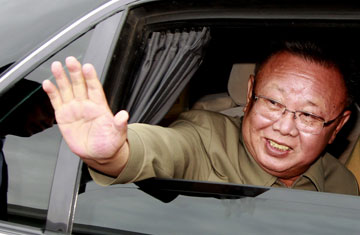
North Korea's leader Kim Jong Il, seen here after meeting with Russian President Dmitri Medvedev in August 2011, died four months later on Dec. 17, 2011
(2 of 2)
Last November, about 20 of North Korea's friends gathered in a London community center for the KFA's annual international meeting. During a question-and-answer session, a man in a Chairman Mao cap and dark glasses complained of his experiences with local-council housing, and probed how someone in his situation might fare in Pyongyang. Cao de Benós told him he didn't know how good he had it, given the substandard shelter faced by millions. Besides, while moving to the DPRK was theoretically an option on the table for long-serving, senior KFA members, it was wisest to visit first. Even the staunchest friends of the North, Cao de Benós said, could find the rhythms of life there difficult to adjust to. "Every day I receive e-mails requesting to live in the DPRK," Cao de Benós said afterward. "Some because they lost their jobs, but many of them are tired of this Westernized life of artifice, criminality, consumerism."
The appeal of a country known for its food shortages, prison camps and repressive personality cult may be difficult to grasp, but for KFA members it exerts an undeniable pull. Its mystique centers on the impression it belongs to a simpler, more innocent time; members marvel at the way that it cannot be seen from the air at night because its lights are off. In a globalized world, it remains the only country truly off the grid.
Hadjipateras put it this way. "People in the DPRK aren't wandering around with iPhones listening to Jay-Z. They can't stand in the middle of the street abusing their leaders. But where in the world can you avoid being constantly bombarded by Coca-Cola, McDonald's, the sexualization of children on TV, the Big Brother reality shows?" To those who suggest North Korea is a Big Brother reality show with 24 million unwitting participants, Hadjipateras is dismissive, although he's never been there to judge for himself. He would "be there in an instant," he says, but travel does not agree with him.
Cao de Benós also chooses to spend only half the year in the "workers' paradise," claiming he can better serve the republic by spending the rest of his time in the West, where he frequently acts as an unofficial regime spokesman in international media. His critics point to this as an indication that Cao de Benós is motivated by the rewards of his role as gatekeeper to the regime, rather than by genuine ideological conviction.
Leonid Petrov, a Korea specialist at the University of Sydney, has had dealings with Cao de Benós for more than a decade. He understands North Korea's unlikely charm and feels a warm sense of nostalgia for the Soviet Union of his youth whenever he visits. But, essentially, that appeal is contingent on being able to leave. "Crossing the border is the exciting thing," he says. "But you don't want to stay there — the place is horrible. Alejandro enjoys acting as a guide who links the two worlds. He's obviously not a defector."
While Hadjipateras mourned an icon he had never met, Cao de Benós had personally encountered Kim on numerous occasions in ceremonial capacities. None of the KFA members knows more about his mysterious son and successor Kim Jong Un than the general public: that he has a military background, is Swiss educated, resembles his grandfather, the state founder Kim Il Sung, and is young and inexperienced. Despite the latter, they hold no concerns about the stability of the regime. "Nothing will change," said Martin, via e-mail. "The DPRK has the bomb."
As far as Hadjipateras is concerned, life in the "workers' paradise" will continue as usual, despite dark days in recent months for his fellow revolutionaries. First Muammar Gaddafi, he laments, then the Dear Leader. "I don't know how I'll react when Fidel Castro dies," he says. "I don't even want to imagine."
